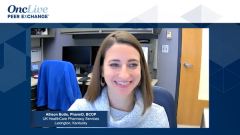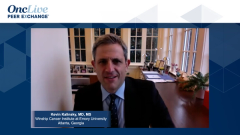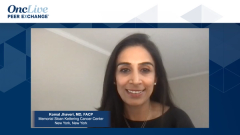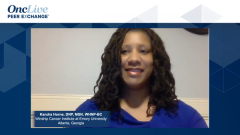
ADC Therapies in Development in Breast Cancer
An overview of novel antibody-drug conjugate therapies currently under investigation as presented at SABCS 2021.
Episodes in this series

Kevin Kalinsky, MD, MS: As we think about moving forward, Komal, if you wouldn’t mind, talk a little about other ADCs [antibody-drug conjugates] in development and things in the forefront of your mind.
Komal Jhaveri, MD, FACP: It’s an exciting field and an exciting class of agents that is the wave of the future for most subtypes, including hormone receptor–positive subtypes. A few agents that come to mind off the bat are datopotamab deruxtecan. This is another TROP2-directed agent, but the payload is similar to the trastuzumab deruxtecan payload. That’s a topoisomerase inhibitor, and at San Antonio [Breast Cancer Symposium], we heard an updated report from Ian Krop in the metastatic triple-negative breast cancer cohort, which was 44 patients, and the response rates were impressive at about 34%.
Interestingly, we also saw activity in patients who’ve had prior TROP2-directed agents. Some of these patients had sacituzumab. Despite that, they had some responses seen with datopotamab. Unlike what we’ve seen with sacituzumab—we were discussing this in terms of the toxicity profile with neutropenia and diarrhea—we’re seeing a little more of nausea and stomatitis with datopotamab, which is distinct with this agent. We did not see the ILD [interstitial lung disease] with the deruxtecan payload, at least in the 44 patients who have been reported out. We’re looking forward to the hormone receptor–positive cohort results with this antibody-drug conjugate.
We also had heard at ESMO [European Society for Medical Oncology Congress] last year about the data for SYD985, which is trastuzumab duocarmazine. This is another antibody drug conjugate that was being studied. Initially it was reported in the phase 3 TULIP trial in HER2 [human epidermal growth factor receptor]–positive metastatic breast cancer. Compared with physician choice therapy, trastuzumab duocarmazine led to a median progression-free survival of 7 months, which was statistically significant. The overall survival data were not mature and did not show any significant results favoring that agent. But in terms of toxicity, keratitis and some pneumonitis have been reported with that agent, most importantly keratitis.
Some activity has been reported in hormone receptor–positive cohorts as well for SYD985, in which the overall response rate was about 28%, and median progression-free survival was about 5 months. That’s something to look forward to for that subtype of breast cancer. In triple-negative breast cancer, we’ve also seen activity with ladiratuzumab vedotin. That’s an MMAE [monomethyl auristatin E] payload, and we’ve seen response rates of 28% to 30% with triple-negative breast cancer. What’s being evaluated in clinical trials is the combination with pembrolizumab with this class of agents. We’ll see how antibody-drug conjugates can be combined with, say, checkpoint inhibitors. We’ve seen programs with sacituzumab in combination with PARP inhibitors that are being evaluated. We’re also seeing these agents being evaluated for early stage disease. There are a lot of exciting investigations trying to expand the utilization of this class of agents for patients with both early and late-stage disease.
Kevin Kalinsky, MD, MS: As you were speaking, I kept looking at Kandra [Horne] because she and I have a shared patient who was on daratumumab and was having a nice response but had significant neuropathy and had to come off the study. We also had a patient on the I-SPY study who received SYD985 and had significant keratitis despite the fact that she was using eye drops prophylactically. We’ll see as those agents come into our clinic. Increasingly this is a team score, right? We’re incorporating various colleagues to help us manage some of these toxicities.
Transcript edited for clarity.






































